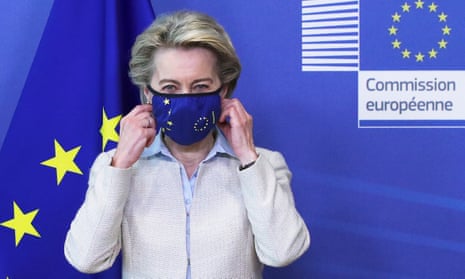The head of the European commission, Ursula von der Leyen, has said the bloc is “ready to discuss” a US-backed proposal for a waiver on the patents for Covid-19 vaccines and the French president, Emmanuel Macron, said he was “absolutely in favour” of the plan as pressure built for a move that could boost their production and distribution around the world.
Pharmaceutical companies reacted with anger, and some countries with private astonishment, at the Joe Biden administration’s decision on Wednesday to back the temporary suspension of vaccine patent rights. One diplomat accused the US of grandstanding and coming up with crowd-pleasing simplistic solutions to long-term problems.
Von der Leyen said the EU’s vaccination effort was accelerating, with 30 Europeans vaccinated each second while it was also exporting more than 200m doses, but it was “also ready to discuss any proposals that address the crisis in an effective and pragmatic manner … That’s why we are ready to discuss how the US proposal for a waiver on intellectual property protections for Covid-19 vaccines could help achieve that objective.”
Macron’s support for the US move marked a shift for France, which had previously argued that a patent waiver would discourage innovation, though a German government spokesman said the plan would create “severe complications” for vaccine production.
The head of the panel reviewing the World Health Organization’s handling of the pandemic, Helen Clark, the former New Zealand prime minister, earlier called on countries that have obstructed the temporary suspension of intellectual property rights for Covid-19 vaccines, such as the UK, Switzerland and EU states, to follow the US lead and back the initiative.
She described the Biden administration’s announcement as a gamechanger and said pharmaceutical companies that had received billions in public money now needed to spread knowledge to scale up vaccine production.
“When the US moves it is such a powerful signal,” Clark told the BBC. “One would expect the UK, the EU and Switzerland and others that have been obstructing the discussion on the waiver need to say: ‘Yes, we are prepared to negotiate’.”
Biden’s top trade adviser, Katherine Tai, said on Wednesday that while the US believed strongly in intellectual property protections, it would open negotiations at the World Trade Organization to relax the rules.
“This is a global health crisis and the extraordinary circumstances of the Covid-19 pandemic call for extraordinary measures,” Tai said.
But the US needs to persuade other countries of the wisdom of its course, and has admitted that negotiations at the WTO and WHO will take time.
Clark said pharmaceutical companies, whose shares took a hit from the US announcement, needed to recognise vaccines are a public good, and urged them to cooperate or be prepared for “heavy-handed” treatment.
She said the WHO and WTO needed to urgently convene the countries that have funded the research and the pharmaceutical countries in order to forge an agreement on speedy voluntary licensing and knowledge tech transfer.
The Gavi vaccine alliance welcomed Biden’s support for waiving intellectual property (IP) rights and also urged Washington to help manufacturers transfer knowhow to boost global production.
The Geneva-based group, which co-leads the Covax dose-sharing programme with the WHO, faces supply constraints after India suspended vaccine exports over its epidemic.
“Gavi urges now that in the interests of global equitable access, that the US supports manufacturers to transfer not only IP but also knowhow in a bid to urgently boost global production,” it said.
Many observers said the US decision had to be seen primarily as a lever to force the pharmaceutical firms to end any obstruction to voluntary knowledge transfer agreements.
Thomas Cueni, the director general of the International Federation of Pharmaceutical Manufacturers and Associations, told the BBC that the US proposal was potentially disruptive, set a terrible precedent and missed the real problems in ensuring vaccines reached the world’s poorest.
“The real bottlenecks are trade barriers preventing companies moving their goods from one country to another, shortage and scarcity in supply chains, and right now the disappointing unwillingness of rich countries to early share doses with poor countries,” Cueni said. “None of these issues are dealt with through the patent label.”
The French foreign minister, Jean-Yves Le Drian, said in a Guardian interview on Wednesday that increasing production rather than waiving intellectual property rights “was number one problem”, and that he wanted to see production increase through vaccine factories installed in Africa.
Some ministers in the UK were concerned that because of legal difficulties, precedents and the threat to innovation, only voluntary agreements with pharmaceutical firms would work.
The US announcement, brewing inside the Biden administration for days, came hours after G7 foreign ministers had hammered out an elaborate compromise in a joint communique on how to distribute vaccines to the world’s poorest. It made no mention of enforced loss of intellectual property, but instead favoured voluntary sharing.
The communique promised to “support, on voluntary and mutually agreed terms, licensing, technology transfer, contract manufacturing and public-private costs and risk sharing”.
The former British prime minister Gordon Brown, now a UN global ambassador and a leader of the campaign to equalise access to vaccines, said: “I welcome the US decision on temporary patent waivers, which makes the Covid-19 vaccine accessible. Now we must make the vaccine affordable. No one is safe until everyone is safe and on 11 June at the G7 leaders meeting, the richest countries should make the momentous decision to pay two-thirds of the $60bn (£43bn) cost of vaccinating the world.”
The shadow UK foreign secretary, Lisa Nandy, and shadow trade secretary, Emily Thornberry, said: “These proposals from the US are welcome and it is vital that the UK government follows the Biden administration’s lead and engages constructively to develop a workable plan at the WTO.”
